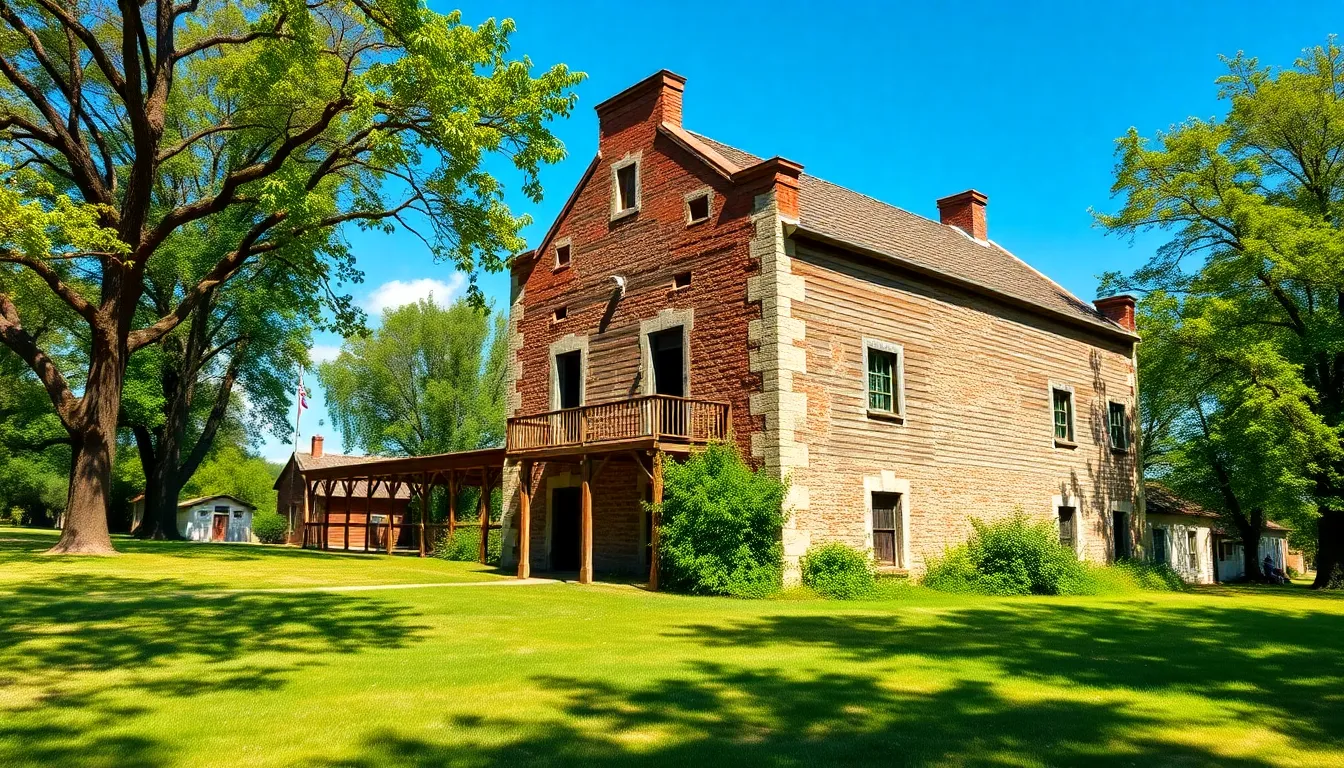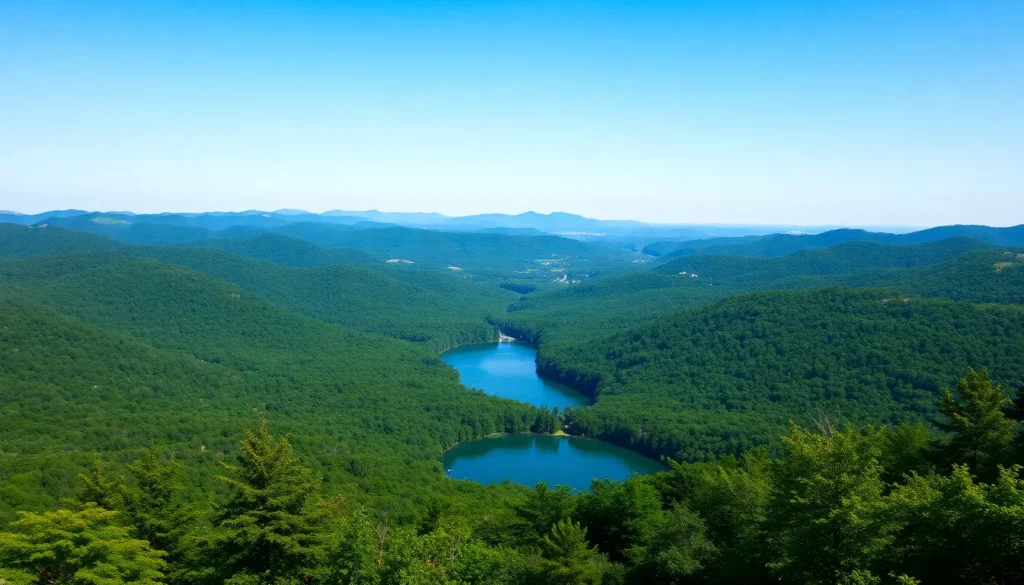Nestled in the heart of the South, Arkansas might not be the first place that springs to mind when thinking of exciting travel destinations. But don’t let its quiet charm fool you; this state is packed with fascinating facts that could make anyone’s jaw drop. From the stunning Ozark Mountains to the quirky quirks of its towns, Arkansas is a treasure trove waiting to be uncovered.
Arkansas Interesting Facts
Arkansas boasts diverse geography, featuring mountains, forests, rivers, and lakes. Its natural beauty attracts outdoor enthusiasts seeking activities like hiking, fishing, and camping. The Ozark and Ouachita Mountains offer stunning views and challenging trails for adventurers.
Cultural heritage enriches the state’s identity, with history reflecting Native American influences and Civil War events. Little Rock, the state capital, houses significant landmarks like the Arkansas State Capitol and the Historic Arkansas Museum. Each town presents a unique character, from the vibrant arts scene in Eureka Springs to the rich music history in Hot Springs.
Economically, Arkansas supports agriculture and manufacturing, with crops like rice, soybeans, and cotton playing vital roles in the state’s economy. The presence of large corporations, including Walmart and Tyson Foods, highlights the region’s role in national commerce.
Education also features prominently, as institutions like the University of Arkansas contribute to research and development. The state’s commitment to improving educational access ensures a skilled workforce for the future.
Festival celebrations throughout the year showcase Arkansas’s local culture, with events like the Arkansas State Fair and the Ozark Folk Festival drawing significant crowds. Neighbors gather to enjoy live music, regional cuisine, and craft markets.
In addition to these highlights, Arkansas offers various state parks. Lake Ouachita State Park and Hot Springs National Park provide opportunities for exploration and relaxation. Visitors find tranquility among the scenic beauty and wildlife encounters. The state’s warm hospitality completes the inviting atmosphere found throughout Arkansas.
Historical Significance

Arkansas has a rich historical tapestry that shaped its development and culture. The state offers insights into its past through early settlements and key historical events.
Early Settlements
Native American tribes, including the Quapaw and Osage, inhabited Arkansas long before European explorers arrived. French explorers traversed the region in the early 18th century, with Henri de Tonti establishing the first European presence near modern-day Arkansas Post in 1686. This settlement attracted French trappers and traders, forming vital economic links. British control followed the French and Indian War, impacting local dynamics. As settlers moved westward during the 19th century, Arkansas emerged as an important territory, eventually gaining statehood in 1836.
Key Historical Events
The Civil War profoundly influenced Arkansas, aligning it with the Confederacy in 1861. Significant battles, such as the Battle of Fayetteville and the Battle of Little Rock, showcased the state’s strategic importance. Reconstruction brought social and political challenges, marked by the establishment of African American rights and segregation laws. In the mid-20th century, the Little Rock Nine event highlighted the struggle for civil rights, as nine African American students integrated Central High School in 1957, a pivotal moment in American history. These events fundamentally shaped Arkansas’s identity and its journey towards equality and progress.
Natural Wonders
Arkansas features stunning natural wonders that captivate outdoor enthusiasts. The state’s diverse landscapes include mountains, forests, rivers, and lakes, perfect for exploration and adventure.
National Parks and Reserves
Arkansas hosts several national parks and reserves that showcase its breathtaking scenery. Hot Springs National Park, known for its thermal springs, provides visitors with relaxing baths and hiking trails. Buffalo National River, one of America’s last free-flowing rivers, attracts paddlers and campers who enjoy its pristine beauty. Petit Jean State Park boasts picturesque views and unique geological formations, making it a must-see destination for nature lovers.
Unique Landscapes
Unique landscapes characterize Arkansas, serving as a playground for different outdoor activities. The Ozark Mountains feature steep ridges and lush valleys, presenting opportunities for hiking, rock climbing, and scenic drives. Other areas like the flat-topped Ouachita Mountains provide contrasting vistas, showcasing a blend of beauty and adventure. The state’s abundant lakes, including Lake Ouachita and Greers Ferry Lake, invite fishing, boating, and swimming, offering a refreshing escape from everyday life.
Cultural Heritage
Arkansas boasts a rich cultural heritage reflecting its diverse influences and traditions.
Cuisine and Food Traditions
Southern comfort foods dominate Arkansas’s cuisine. Barbecue stands out, with smoked meats served at festivals and family gatherings. Additionally, dishes like fried catfish and chicken and dumplings highlight the state’s culinary roots. Arkansas is known for its produce, particularly fruits and vegetables like blueberries and tomatoes, which feature prominently in local recipes. Gourmets find joy in tasting unique flavors at farm-to-table restaurants. Every bite tells a story, connecting residents and visitors to the region’s agricultural heritage. Local festivals often showcase traditional cooking methods, emphasizing community involvement and celebration of culinary artistry.
Arts and Festivals
Art and music thrive in Arkansas, with vibrant expressions seen throughout its towns. Local galleries spotlight emerging artists, while Eureka Springs hosts numerous art events each year. Music festivals like the Ozark Folk Festival celebrate regional sounds, attracting artists and audiences statewide. Additionally, unique events such as the Little Rock Film Festival promote cinematic talent and creativity. Craft fairs celebrate local artisans, offering handmade products and interactive experiences. Every event serves to unite communities, allowing for cultural exchange and appreciation. Festivals highlight Arkansas’s identity, fostering deeper connections among attendees and reflecting the state’s artistic spirit.
Economic Highlights
Arkansas’s economy reflects a blend of traditional and modern industries, showcasing diverse opportunities for growth.
Major Industries
Agriculture plays a crucial role in Arkansas’s economic landscape. Key crops include rice, soybeans, and cotton, which contribute significantly to the state’s output. Manufacturing also holds importance, with leading companies like Walmart and Tyson Foods driving employment and innovation. Aerospace and defense industries have grown due to investments in these sectors, promoting technological advancements. Timber, another vital resource, supports local jobs and businesses, particularly in small towns. The tourism sector thrives thanks to natural attractions and cultural heritage, drawing visitors year-round.
Innovations and Growth
Recent years have seen remarkable innovations in Arkansas’s tech industry. Cities like Little Rock are becoming hubs for startup companies, promoting creativity and entrepreneurship. Educational institutions, such as the University of Arkansas, drive research initiatives that enhance workforce skills. Investment in infrastructure supports economic expansion, fostering connectivity across the state. The rise of renewable energy sources, particularly solar power, demonstrates Arkansas’s commitment to sustainable practices. Collaboration between government and businesses fuels growth, attracting new industries to the region.
Arkansas Interesting Facts
Arkansas offers a wealth of intriguing facts that reveal its unique character and culture.
Unique Trivia
The state’s nickname, The Natural State, reflects its stunning landscapes. Arkansas features the only active diamond mine in the U.S., located at Crater of Diamonds State Park. Visitors can search for real diamonds. Historic Little Rock Central High School serves as a civil rights landmark, highlighting its pivotal role in desegregation. The state also houses the Ozark Folk Center, preserving traditional crafts and music. Arkansas ranks fifth in the nation for its production of rice. This agricultural achievement emphasizes the state’s role in food production.
Lesser-Known Insights
More than 600,000 individuals call the capital, Little Rock, home. The city boasts the William J. Clinton Presidential Library, a significant attraction. Some argue that the world’s largest river island, Merrisach Lake, resides in this state. Arkansas’s innovative energy initiatives place it at the forefront of solar power adoption. The state also features a surprising collection of over 400 species of birds, a delight for birdwatchers. Many outdoor enthusiasts flock to its numerous state parks, which cover nearly 70,000 acres. Arkansas holds annual events like the World Championship Cow Chip Throwing Contest, showcasing its eccentric traditions.
Conclusion
Arkansas stands out as a hidden gem filled with diverse landscapes and rich cultural heritage. Its natural beauty invites outdoor adventures while its vibrant festivals celebrate the state’s unique traditions. With a blend of history and innovation, Arkansas continues to evolve, offering visitors a glimpse into its past and a taste of its future. From the stunning Ozark Mountains to the bustling arts scene, there’s always something new to discover. Whether exploring its historical landmarks or enjoying its culinary delights, Arkansas promises an experience that’s both refreshing and memorable.

